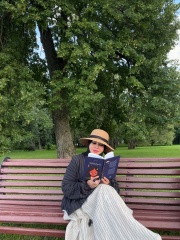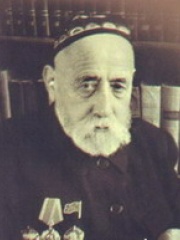
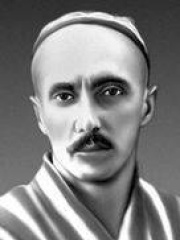
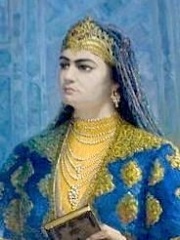
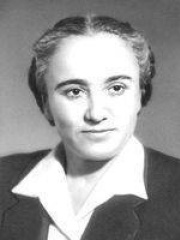
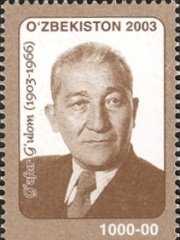
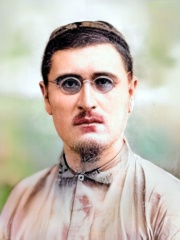


The Most Famous
WRITERS from Uzbekistan
This page contains a list of the greatest Uzbekistani Writers. The pantheon dataset contains 7,302 Writers, 11 of which were born in Uzbekistan. This makes Uzbekistan the birth place of the 68th most number of Writers behind Armenia, and Indonesia.
Top 10
The following people are considered by Pantheon to be the top 10 most legendary Uzbekistani Writers of all time. This list of famous Uzbekistani Writers is sorted by HPI (Historical Popularity Index), a metric that aggregates information on a biography's online popularity. Visit the rankings page to view the entire list of Uzbekistani Writers.

1. Sadriddin Ayni (1878 - 1954)
With an HPI of 67.08, Sadriddin Ayni is the most famous Uzbekistani Writer. His biography has been translated into 31 different languages on wikipedia.
Sadriddin Ayni (Tajik: Садриддин Айнӣ, Persian: صدرالدين عينى, Russian: Садриддин Саидмуродович Саидмуродов; 15 April 1878 – 15 July 1954) was a Tajik intellectual who wrote poetry, fiction, journalism, history, and a dictionary. He is regarded by Tajiks as Tajikistan's national poet and one of the most important writers in the country's history.

2. Hamza Hakimzade Niyazi (1889 - 1929)
With an HPI of 62.77, Hamza Hakimzade Niyazi is the 2nd most famous Uzbekistani Writer. His biography has been translated into 30 different languages.
Hamza Hakimzade Niyazi (March 6 [O.S. 22 February] 1889 – 18 March 1929) was an Uzbek author, composer, playwright, poet, scholar, teacher, and political activist. Niyazi is widely seen as one of the leading figures in the early development of modern Uzbek literature. He is generally considered the first Uzbek playwright, the founder of modern Uzbek musical forms, as well as the founder of Uzbek social realism. During the Russian Revolution, he supported the Bolsheviks, as they strongly opposed the system of feudal rule that was prevalent in much of Central Asia. He was one of the first Uzbeks to join the Communist Party of the Soviet Union and dedicated his life to promoting literacy and education in his homeland, opening schools and orphanages. Apart from Uzbek, Niyazi was fluent in several other languages, including Arabic, Persian, Russian, and Turkish. In addition to writing textbooks, non-fiction works, and newspaper articles, Hamza wrote plays, musicals, poetry, and novels. His prominent works include the novelette Yangi Saodat, the song Yasha, Shoʻro, and the poem memorializing honor killing victim Tursunoy Saidazimova as a martyr. His works generally dealt with social issues, such as women's rights, social inequality, and the prevalence of superstition. Born to a devout Muslim family, he became an atheist over time, supporting measures to control religious fanaticism and superstition in Central Asia. Traveling village by village, he tried to help teach people to read the Uzbek language as well as discourage violence against women and superstitious practices and promoted the hujum by organizing rallies. Stationed in Shohimardon to help with the five-year plan, he knew that the shrine in Shohimardon to Ali was not the actual resting place of Ali and intended to remove it, as the local elites used it to extort the local peasants by demanding they pay alms to it. However, the local clergy was outraged by his activities of promoting the hujum and trying to educate the populace about the dubious nature of the shrine. Consequently, Hamza was stoned to death on 18 March 1929. After his death, Hamza was hailed as a martyr in the struggle against feudalism and religious fanaticism. Streets, a station of the Tashkent metro (later renamed), the theater in Tashkent where he taught drama, and a literature prize were named in his honor. Statues built in his likeness were installed in numerous cities in the Uzbek SSR, and his character was the main protagonist in the 1961 movie Hamza and the 1970s TV series Fiery Roads. However, after independence, Hamza became significantly less revered, as his political views supportive of the Soviet Union and opposition to religious activities were seen as un-Uzbek and anti-Muslim, despite the fact that many of the customs he pushed to abolish were derived from pre-Islamic practices.

3. Nodira (1792 - 1842)
With an HPI of 60.80, Nodira is the 3rd most famous Uzbekistani Writer. Her biography has been translated into 28 different languages.
Nodira (also spelled Nadira; 1792–1842) was a poet in the Khanate of Kokand, who wrote in Chagatai Turkic and Persian. Mahlar-ayim was her birth name. Nadera was her pen name, which she used along with Kamila in her Chagatai poems. In her Persian poems, she wrote under the pen name Maknuna. She was born in Andijan, which was governed by her father Rahmanqulibi, who was the uncle of the sixth ruler of Kokand, Alim Khan of Kokand (r. 1801–1810). In 1808, Nodira was married to Alim Khan's brother Muhammad Umar Khan, whom she had two children with, Muhammad Ali Khan and Sultan-Mahmud. In 1810, Muhammad Ali Khan had Alim Khan murdered, subsequently becoming the new ruler of Kokand. After his death in 1822, Nodira played an important role in court politics and state affairs during the reign of her son Muhammad Ali Khan. She also promoted cultural and social development, sponsoring mosques, madrasas, and bazaars. In 1842, after the capital Kokand was captured by the Emirate of Bukhara, its ruler had Nodira and her sons executed. According to the modern historian Scott C. Levi, "The most famous of Khoqand’s women poets was Nadira". Her writings, numbering nearly 10,000 verses, include a divan (collection of poetry) featuring 136 poems in Chaghatai and 44 in Persian. Among the prominent poetesses Nodira would bring together at Kokand's court were Jahonotin Uvaysiy, Mahzuna, and Dilshad Barna.

4. Zulfiya (1915 - 1996)
With an HPI of 59.21, Zulfiya is the 4th most famous Uzbekistani Writer. Her biography has been translated into 25 different languages.
Zulfiya Isroilova, known by her pen name Zulfiya (in Cyrillic Зулфия; 1 March 1915 in Tashkent, Russian Empire – 1 August 1996 in Tashkent, Uzbekistan) was a Soviet and Uzbek writer. She repeatedly was a leader or chief editor for various media, participating in Soviet delegations to various conferences. The Uzbek National Award for Women was created and named after her.
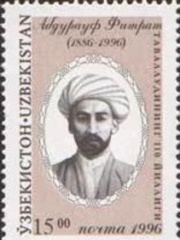
5. Abdurauf Fitrat (1885 - 1938)
With an HPI of 58.43, Abdurauf Fitrat is the 5th most famous Uzbekistani Writer. His biography has been translated into 21 different languages.
Abdurauf Fitrat (sometimes spelled Abdulrauf Fitrat or Abdurrauf Fitrat, Uzbek: Abdurauf Fitrat / Абдурауф Фитрат; 1886 – 4 October 1938) was an Uzbek author, journalist, politician and public intellectual in Central Asia under Russian and Soviet rule. Fitrat made major contributions to modern Uzbek literature with both lyric and prose in Persian, Turki, and late Chagatai. Beside his work as a politician and scholar in many fields, Fitrat also authored poetic and dramatic literary texts. Fitrat initially composed poems and authored essays and polemic prose in the Persian language, but switched to a puristic Turkic tongue by 1917. Fitrat was responsible for the change to Uzbek as Bukhara's national language in 1921, before returning to writing texts in Tajik later during the 1920s. In the early 1920s, Fitrat took part in the efforts for Latinization of Uzbek and Tajik. Fitrat was influenced by his studies in Istanbul during the early 1910s, where he came into contact with Islamic reformism and authored several philosophical essays. After returning to Central Asia, he turned into an influential ideological leader of the local jadid movement. In opposition to and in exile from the Bukharan emir he sided with the communists. After the end of the emirate, Fitrat accepted several posts in the government of the Bukharan People's Soviet Republic, before he was forced to spend a year in Russia. Later, he taught at several colleges and universities and held a research position at the Academy of Sciences of the then Uzbek SSR. During Stalin's Great Purge, Fitrat was arrested and prosecuted for counter-revolutionary and nationalist activities, and finally executed in 1938. After his death, his work was banned for decades. Fitrat was rehabilitated in 1956, yet critical evaluation of his work has changed several times since. While there are Tajik criticis that call the likes of Fitrat "traitors", other writers have given him the title of a martyr (shahid), particularly in independent Uzbekistan.

6. Gʻafur Gʻulom (1903 - 1966)
With an HPI of 58.12, Gʻafur Gʻulom is the 6th most famous Uzbekistani Writer. His biography has been translated into 21 different languages.
Gʻafur Gʻulom (May 10, 1903 – July 10, 1966) was an Uzbek poet, writer, and literary translator. He is best remembered for his stories Shum Bola (The Mischievous Boy) (adapted for film in 1977) and Yodgor. Gʻafur Gʻulom is also known for translating the works of many influential foreign authors, such as Alexander Pushkin, Vladimir Mayakovsky, and William Shakespeare. He translated Le Mariage de Figaro of Pierre Beaumarchais, Othello of William Shakespeare, and Gulistan of Saadi Shirazi into Uzbek. Gʻafur Gʻulom is considered to be one of the most influential Uzbek writers of the 20th century. He is also regarded as one of the founders of modern Uzbek poetry, along with Hamza Hakimzoda Niyoziy. Gʻafur Gʻulom received the prestigious State Stalin Prize in 1946 and became a National Poet of the Uzbek SSR in 1963.

7. Choʻlpon (1897 - 1938)
With an HPI of 55.79, Choʻlpon is the 7th most famous Uzbekistani Writer. His biography has been translated into 17 different languages.
Abdulhamid Sulaymon oʻgʻli Yunusov (Uzbek: Abdulhamid Sulaymon oʻgʻli Yunusov, Абдулҳамид Сулаймон ўғли Юнусов, 1893 – 4 October 1938), most commonly known by his penname Choʻlpon (sometimes spelled Cholpán in English), was an Uzbek poet, playwright, novelist, and literary translator. Choʻlpon was one of Central Asia's most popular poets during the first half of the 20th century. He was also the first person to translate William Shakespeare's plays into the Uzbek language. Choʻlpon's works had a major impact on the works of other Uzbek writers. He was one of the first authors to introduce realism into Uzbek literature. Choʻlpon was executed during the Great Purge under the leadership of Joseph Stalin.

8. Furqat (1858 - 1909)
With an HPI of 54.70, Furqat is the 8th most famous Uzbekistani Writer. His biography has been translated into 15 different languages.
Zokirjon Xolmuhammad oʻgʻli (Uzbek: Zokirjon Xolmuhammad oʻgʻli, Зокиржон Ҳолмуҳаммад ўғли) (1859–1909), better known by his pen name Furqat, was an Uzbek author, poet, and political activist. He had a major influence on the development of modern Uzbek literature. He wrote one of the earliest pamphlets and satirical articles in Uzbek. Furqat, like may other writers of the tsarist colonial period, was forced to praise the Russian Empire and its culture in his work. When he started to write poems that were critical of the cruelty of Russian rule, he was exiled to Chinese Turkestan.

9. El-Registan (1899 - 1945)
With an HPI of 54.15, El-Registan is the 9th most famous Uzbekistani Writer. His biography has been translated into 17 different languages.
Gabriel Arkadyevich Ureklyan (Russian: Габриэль Аркадьевич Уреклян; Armenian: Գաբրիել Էլ-Ռեգիստան; 15 December 1899 – 30 June 1945), better known as El-Registan (Эль-Регистан), was a Soviet Armenian poet best known for having co-written the lyrics to the State Anthem of the Soviet Union along with Sergey Mikhalkov.
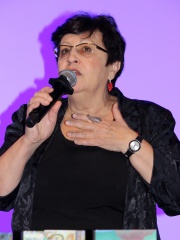
10. Dina Rubina (b. 1953)
With an HPI of 53.10, Dina Rubina is the 10th most famous Uzbekistani Writer. Her biography has been translated into 21 different languages.
Dina Ilyinichna Rubina (Russian: Дина Ильи́нична Ру́бина, Hebrew: דינה רובינה; born 19 September 1953 in Tashkent) is a Russian-language Israeli prose writer.
People
Pantheon has 11 people classified as Uzbekistani writers born between 1792 and 1971. Of these 11, 2 (18.18%) of them are still alive today. The most famous living Uzbekistani writers include Dina Rubina, and Khosiyat Rustam. The most famous deceased Uzbekistani writers include Sadriddin Ayni, Hamza Hakimzade Niyazi, and Nodira.
Living Uzbekistani Writers
Go to all RankingsDeceased Uzbekistani Writers
Go to all RankingsSadriddin Ayni
1878 - 1954
HPI: 67.08
Hamza Hakimzade Niyazi
1889 - 1929
HPI: 62.77
Nodira
1792 - 1842
HPI: 60.80
Zulfiya
1915 - 1996
HPI: 59.21
Abdurauf Fitrat
1885 - 1938
HPI: 58.43
Gʻafur Gʻulom
1903 - 1966
HPI: 58.12
Choʻlpon
1897 - 1938
HPI: 55.79
Furqat
1858 - 1909
HPI: 54.70
El-Registan
1899 - 1945
HPI: 54.15
Overlapping Lives
Which Writers were alive at the same time? This visualization shows the lifespans of the 9 most globally memorable Writers since 1700.

